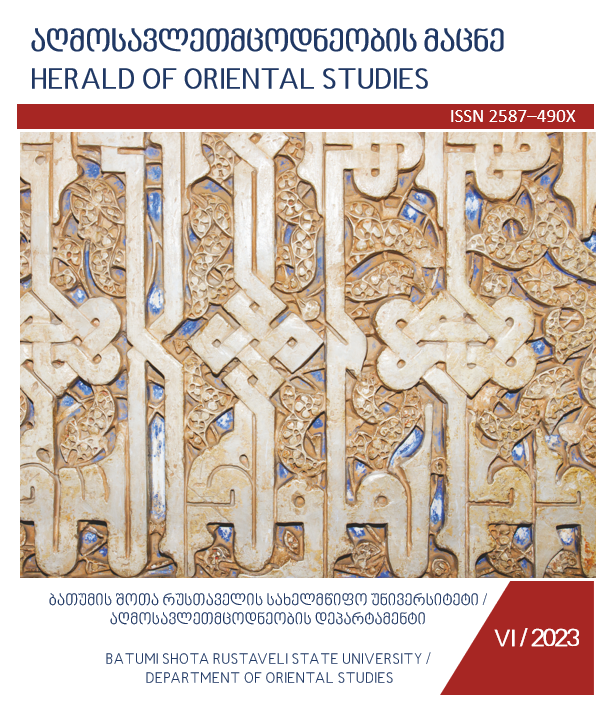უდეტრები თურქეთის საქართველოს ერთი ხეობის მკვიდრთა მეტყველებაში
Udetrebi in the speech of the Georgian inhabitants of one of the valleys in Turkey
Author(s): Natela PhartenadzeSubject(s): Language studies, Language and Literature Studies, Philology
Published by: ბათუმის შოთა რუსთაველის სახელმწიფო უნივერსიტეტი, ჰუმანიტარული მეცნიერებატა ფაკულტეტის აღმოსავლეთმცოდნეობის დეპარტამენტის „ელექტრონული ჟურნალი“.
Keywords: Dialect; Adjectives; Adverbs; Conjunctions; Conjunctions; Particles;
Summary/Abstract: In Georgian historiography, one of the districts of Klarjeti – „Nigali" can be found under different names, particularly: Ligani, Livana, Nigali. Historically, Nigali was one of the culturally and economically developed parts of Tao-Klarjeti. Georgian culture flourished here in the 9th-10th centuries. The monastic centers of Berti, Opiza, Khandzta, Shatberdi, Forti, Korideti keep written original works, as well as the literature translated from foreign languages. Lebanese speech is rich in dialects, sayings and proverbs, which are well noticed even by the locals themselves. People from Claskuri, Deveshkeli, Hebeli, Maradidi, Murguli can be guessed by their special dialect. The purpose of our study is to outline and analyze the features associated with the use of udetrebi (in Georgian grammar, it is a united term for adverb, postposition, conjunction, particle and interjection) in the speech of the inhabitants of the Nigali valley. Interesting nuances can be observed in the udetrebi of the Georgian language, which is spoken by the inhabitants of the Nigali Valley. Having a function of an adverb of place, there are plural forms of first and second person pronouns with ending -ში’: ჩვენში; თქვენში. Adverbs of place “ზემოთ” (above), “ქვემოთ” (below) occur with phonetic changes: ზომოთ; ქომოთ... The word შიგან is often used with the function of an adverb typical of the Georgian language: სახლში შიგან არ შევსულვართ.. Adverbs აქ’, იქ’ have the endings -ში and -ზე (functioning as prepositions), on the basis of which complex-root adverbs are obtained: აქში’, იქში’, აგზე’ ( აქზე), იგზე ( იქზე). Adverbs of place აქ, იქ ending in -ზე’ can also add the suffix - დამ: აგზედამ, იქნამდი... In similar examples, two letters ა appear: აქნობაამდი... The form იქაურობაში' is replaced by the word იქნობაში'. The endings -კე//-კენ are added to unusual adverb forms: წინესკე, ზეისკე, ზედეთკენ, შიგნით კე... To complicate adverbs, the ending -დამ' is used: ზეიდამ; იქიდამ.. The interrogative adverb სად’ occurs in the form ჰა’ (ს→ჰ, -დიკარგება). As an adverb of time, there are sometimes cases of doubling the stems: ზაფხულ, მალ... ზაფხულ-ზაფხულ მალ-მალ; საღამსაღამ... As a result of metathesis, the adverb of time მერმე' has changed its form and is presented in the form მემრე'. Adverbs გაისად ’, მერმის’ changed their forms into მიორეთ ’// მიერეთ’, მიერეზე’ with the meaning of the adverb of time ... The adverb დიდხანს' changed into ბარსახან (ბარე სამ ხან). The meaning of the adverbs of circumstance ამაოდ’, ტყუილუბრალოდ’ is conveyed by an archaic word ცუდედ (comp. old Georgian ცუდად’ - ამაოდ, უსარგებლოდ). The suffix -რ is lost in the circumstantial adverbs ending with - ებრ: მათურებ... The forms with ending -ვით are changed into -ვენ: ჩემსავენ, ჩვენსავენ, თქვენსავენ, მათსავენ (ჩვენ-ს-ა-ვით→ჩვენ-ს-ა-ვენ): The word აქასავენ’ //აქსავეთ’ has the meaning of the circumstantial adverb. The question adverb როგორ’(how) is replaced by the form რავლი’: რავლი ხარა? რავლი მოხუელით? რავლი ხართა ჩვენებურები?!... Adverbs denoting the number of times with the particle ჯერ' are replaced by the word პირი'. They are attached to a numeral: ორპირ, ერთპირ, ათპირ... The speech of the inhabitants of the villages (Kabarjeti, Kavrieti, Chilavri, Kura, Zhuani, Buzhuri, Bashkoi, Arkhva, Korideti, Dzantsuli, Gurbini...) built on the slopes of the Murguli river valley gives a special flavor to the Nigali Georgian dialect. This is also observed in the formation of adverbs. Namely, instead of the adverb ერთად’, ერთხელაჲ’ is used. Among the adverbs, the forms introduced through the Turkish language rarely appear: თექთუქ (tek-tek), ბაშთან (baştan), ბირზამან (bir zaman), ებბედი (არაბ.ebedien) ზაათი (არაბ. zaten), თექრარ (არაბ. Tekrar), ჰემენ (სპარს. Hemen), აზბიშეი (az birşey)... Dialectical coloring is also given to suffixes that play the role of prepositions. In particular, the suffix -ვით gives variants with -ვენ, - ვეთ, -ვეფ: თქვენსავეთ, ქვასავენ, ტურასავეფ... The suffix -თვის is presented by variants -თვინ // -თინ: გოგოსთვინ, ბაქლავასთინ... The suffix -კენ can be found in the form of -კე: თქვენკე, ბორჩხისკე არი; ხიდისკე წესულან... The suffix -კე is met in the adverbs as well: უკნისკე, წინისკე... The adverb უკან is added to the words in Genitive case and expresses unity; it has a function of the suffix -თან’ (together): პურის უკან, ჭადის უკან, გურჯების უკან... The suffix -მდე’ is not found in the speech of the Nigali Georgian. There are -მდი’ and -მდინ’ options: სოფლამდი, ქალაქამდინ... The conjunction. The conjunction რომ’ is mostly found in the form of რომე’. A simplified form of მაგრამ’ is მარა’. The oppositional conjunction მაგრამ’ is often replaced by the Turkish borrowing ჰამა’. Instead of the subordinating conjunction რომ’, there is used ქი’, the conjunction of Persian origin, introduced through Turkish and accompanied by many nuances (კი - რომ, რომელი, რათა, ვინაიდან, ხოლო, განა). The particle. The vitality of the interrogative particle in the Nigali Georgian language is determined by stress. In an interrogative sentence, the stress is always on the interrogative particle ა': შენ აქა ხარა?; ტანზე რასა ვიცვამთა?!; შენა ვისი გოგო ხარა?... თურმე’ is replaced by the particle მეგერ’ of Persian origin, introduced through Turkish. The Turkish borrowing აჯაბ’ (Arab. acap) is used in the meaning of ნეტავი’, ნუთუ’, მართლა’, განა’ (really).
Journal: საერთაშორისო სამეცნიერო ჟურნალი „აღმოსავლეთმცოდნეობის მაცნე“
- Issue Year: 6/2023
- Issue No: 1
- Page Range: 148-169
- Page Count: 22
- Language: Georgian

